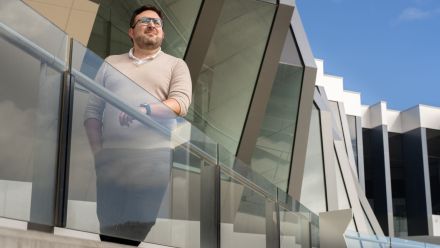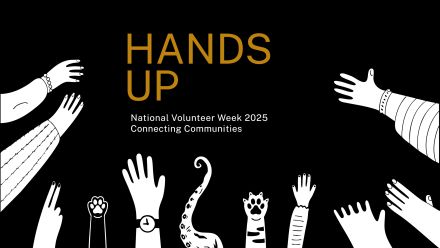Frank Exon
When I arrived at ANU in 1992 I wanted to study science. I was interested in how people interacted with the environment and how it shaped their lives. I was not sure where it would lead but I was happy to go along for the ride.
My studies opened my mind to the complex relationships between the everyday actions of people and the Earth's natural systems. I found my academic feet in human ecology and became, and remain, fascinated by the links between science, policy and action.
I graduated in 1996 with an Honours degree in Science but the Howard Government won office and there were no jobs in Canberra for new uni graduates. Instead I landed a job with the NSW Government, relocated to Braidwood and became the first coordinator of the Upper Shoalhaven Catchment Management Committee.
I loved working with committee members on the first natural resource management plan for the Upper Shoalhaven catchment. Catchment management was a great framework for decision-making. It combined the grassroots knowledge of local farmers and environmentalists with the expertise of NSW Government officials and the political nous of local government councilors.
Sadly the model was expensive. My job evaporated when Catchment Management Committees across NSW were rationalised into a much smaller number of Catchment Management Boards.
I was invited to take on a planning role in response to new Australian Government funding arrangements. It saw me working with community, government and industry representatives in preparing the first natural resource management strategy for South East NSW.
Three years on from graduation I won a permanent job in Braidwood. I was responsible for delivering on-the-ground soil conservation and native vegetation projects across a district with diverse landscapes and communities.
Soil conservation in NSW had been the traditional stomping ground of graduates from Hawkesbury Ag College. It was kind of ok if you had studied at Wagga (CSU School of Agriculture) but as an ANU honours graduate I was a bit of a novelty. It was a blokey culture that revolved around diggers, dozers and dirt.
I was working to control severe erosion on some of the most erodible soil landscapes in NSW. My science background was hugely beneficial as I rapidly expanded and applied my practical understanding of soil science, ecology, geomorphology, engineering and land rehabilitation.
I also needed to develop and sharpen a number of skills that a science degree did not train me for: project management, contract management, negotiation and staff management.
In 2004 I had to make the first significant decision of my fledgling career: stay with the Department or chance my arm with the new Southern Rivers Catchment Management Authority?
I am not a policy, regulatory or compliance kind of guy so it was not hard for me to choose to work for Southern Rivers Catchment Management Authority (CMA). Its raison d'être, community engagement in natural resource management, was as close a match to my human ecology background as I could wish for.
Southern Rivers CMA operated across South East NSW. Our work was turbo-charged by substantial Australian Government investment. It was exciting times. I found myself managing a major erosion control program designed to improve water quality in the Upper Shoalhaven and Kangaroo River catchments. As a result I became increasingly involved in managing the relationship with a major funding partner, Sydney Catchment Authority.
I had mastered my chosen profession but felt I had taken it as far as it could go. I needed to get back to my academic roots so in 2012 I started a postgraduate course by distance education that dovetailed with my work in community and stakeholder engagement. This time I chose Arts rather than Science: a communication Masters degree through CSU.
My study was supported by Southern Rivers CMA and was instrumental in enabling me to drive the organisation's first foray into online community engagement.
A change in government saw the organisation's future tied to a wider reform agenda. My studies enabled me to provide strategic communications counsel and advice to senior management on the 'perfect storm' they faced in downsizing, restructuring and amalgamation.
In 2013 I took a voluntary redundancy and left the NSW public service. After a short break I was ready for my first full-time communication role. I found it with Murray-Darling Basin Authority, starting in stakeholder engagement and moving into internal communications.
With an eye to longer-term employment my next role saw me move to ACT Government as a communications officer in the Environment and Planning Directorate. I was charged with driving community engagement on climate change and loved the challenge of working in a fast-paced and diverse communications environment.
I am now enjoying life as a contractor providing communication services for a large public sector client on a significant change management project. Later this year I return to my studies and plan to complete my Master degree in February 2016.
I left ANU as science honours graduate who was a little wet behind the ears. Twenty years on I am an older and somewhat wiser communications professional.
The missing element of this career story is that I did not do it alone. I have worked with and learnt from a really diverse bunch of people. Some supported me, some challenged me and others annoyed the hell out of me. I think I learnt something from them all.
You may have a career mapped out and work your butt off academically to that end. However, I have found that the relationships you develop with those you interact with can be a major influence in shaping your career, personal values and professional development.
Please do not make the mistake of hoarding your knowledge! Sharing what you know with others builds a pool of collective knowledge and more often than not you will find the favour returned.
You may not be able to change the world but your ability to influence others is only limited by your drive, imagination and skill in identifying when the conditions are right for change.


